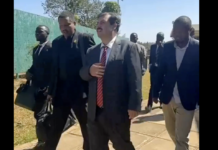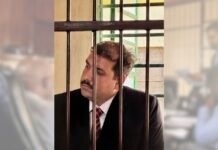Turkish authorities should investigate claims of the torture and ill-treatment of two villagers, Osman Şiban (50) and Servet Turgut (55), who were allegedly thrown from a helicopter after their detention by gendarmes on September 11, Amnesty International said in a public statement on Friday.
The statement said Amnesty International found the allegations credible as medical reports indicated that both men sustained injuries consistent with falling from a height.
Şiban and Turgut are villagers from Çatak in the eastern province of Van. On September 11 a clash between the Turkish military and members of the outlawed Kurdistan Workers’ Party (PKK), a secessionist group listed as a terrorist organization by Turkey, the European Union and the United States, took place in the vicinity of Çatak. The two were working in their fields on the day of the incident.
According to eyewitness accounts reported by their lawyer, a group of soldiers came to the village to carry out ID checks. They detained Turgut on grounds that he was “acting suspiciously” while working in the fields. Between 15 to 20 gendarmes came to the village a second time in the late afternoon and asked for Şiban, who identified himself. He was also detained for allegedly aiding and abetting a terrorist group.
The gendarmes took the two men on foot, over a hill and to a helicopter in a clearing. A group of villagers followed the gendarmes and observed the pair being put into the helicopter, which then flew away. Their families did not hear from them for two days, after they left with the gendarmes.
Relatives received a call from the gendarmerie on September 13 asking for Servet Turgut’s ID number but stating that he was not with the gendarmerie. Later that day, members of the two men’s families learned that they were both in the Van Regional Teaching and Research Hospital’s intensive care unit where, as of September 28, Turgut is still in critical condition in a medically induced coma. His medical report refers to bruising of both eyes and ears and abrasion of the hands and chest cavity following a “fall.”
Amnesty International said it was “deeply concerned at the serious allegations of torture and other ill-treatment and the shocking allegation that they were thrown from the helicopter.” The human rights watchdog urged the Turkish government to subject the allegations to “a prompt, independent and impartial investigation” and to bring those suspected to have carried out the alleged torture or other ill-treatment to justice in fair trials.
Turgut’s brother Naif Turgut said he visited his brother twice in the hospital and that he was still in critical condition with a cerebral hemorrhage. “My brother was afraid and crying, he said they were blindfolded and thrown from a height.”
Naif Turgut claimed that he was called four days after the incident. An unidentified man told him that he saw two people being thrown out of a helicopter at dusk. “He said his conscience did not allow him to remain silent.”
Şiban’s medical report refers to a possible neck injury, bruising to the elbows and knees and severe bruising of both eyes as well as appearing confused and poorly oriented. His lawyer told Amnesty International that he was suffering from partial memory loss but had told his family that they had been beaten by the gendarmes. Şiban was released from the hospital on September 20.
Şiban was taken to a military hospital on September 22 by dozens of gendarmes, according to his lawyer. He was tested for COVID-19 and received a medical report stating that he was not fit to provide an official statement to the authorities.
The Van Governor’s Office issued a statement of September 21 referring to the case in the context of the military operation, stating that Turgut was in the vicinity of the operation “on the lookout and acting suspiciously. He fell and injured himself on some rocks while running away, having refused to comply with an order to stop, and was caught despite resisting arrest and detained according to procedure.”
According to the governor’s office, Şiban was believed to have been aiding and abetting members of the terrorist organization.
The statements contradict the version of events recounted by the villagers who witnessed the detentions and stated that both men were healthy at the time of boarding the helicopter, as well as the hospital medical reports.
Investigations of the villagers’ allegations are subject to a secrecy order, meaning the lawyers are unable to access the files relating to their clients. Amnesty International referred to this order and said that while there may be some aspects to the investigation that the authorities may legitimately argue require some reporting restrictions, a blanket application of a secrecy order may impede the right of the victims of alleged torture and other ill-treatment to access justice.
Amnesty International also called on the authorities to ensure that Şiban and Turgut have access to effective legal representation throughout the investigation and any subsequent prosecution.
















[…] הז'נדרמיה הטורקית ב -11 בספטמבר, כך אמר ארגון אמנסטי בהצהרה לציבור ביום […]
[…] הז’נדרמיה הטורקית ב -11 בספטמבר, כך אמר ארגון אמנסטי בהצהרה לציבור ביום […]